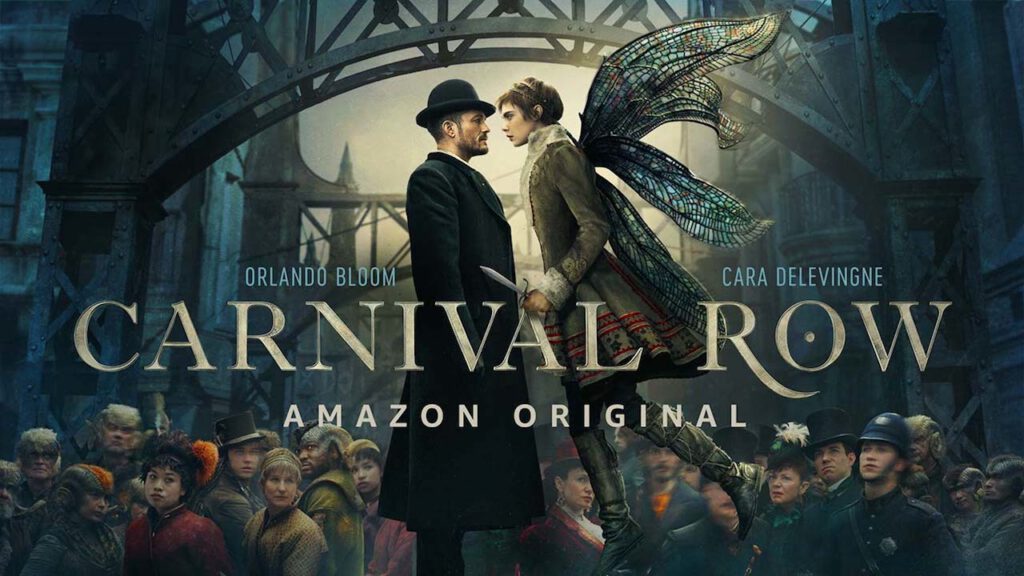At SDCC, people wait in lines. Sometimes you choose the wrong line. Who hasn’t? Sometimes the line is chosen for you. Sometimes the masters of the line are unfair. And perceived unfairness—real or imaginary—causes anger to percolate and heat up your insides. If you can’t say anything such injustice might weigh heavily on you, like a weight on your chest or an invisible beast clutching and squeezing your heart.
At the press conference for Amazon Prime’s new series, “Carnival Row,” reporters were told the series was timely and that, without episodes to prescreen, they should take a walk through the activation to get the vibes. Two days later, I took a brief walk into the world of “Carnival Row,” an alternative Victorian era reality where the world is even further divided by imperialism than in real Victorian times. According to the press materials, the “exotic homelands” of “mythological immigrant creatures” were “invaded by the empires of man.”
At the activation, we are first given a black pouch of coins and then a card that divides us into two categories: human and creature. My husband was designated as human; I was designated as a creature. The bobby handling the immigration desk would ask to see your papers. On one side of his podium, he is genial and helpful for the humans, gladly greeting them into the city. They filed through without waiting. On the other side, he yelled and threatened us. We were told to form two lines. One “creature” accidentally touched the curtain that led to the street scene and was immediately sent to the back of the line. The bobby snorted that I was “a creature with a creature” when he saw my dragon (because what is a dragon lady without her dragon?). The best one could hope for is to be ignored. And yet, in another time and place being ignored would be the very evidence of the persistence of prejudice.
Once in the street scene we were allowed to mingle briefly before both humans and creatures entered a darkened room where a woman dressed in a corset and lace knickers or petticoats was performing on a small round stage. A horned female creature acted as an emcee as we were told to sit around the stage—on the round cushioned seats or at the bar under the light of its faux stained glass. After some dancing and singing—all performers dressed with an air of tattered decadence and a slight naughtiness of a long bygone era, a creature ran in and was given shelter before two bobbies burst into the room. The bobbies told attendees that even humans can become enemies of the state if they are found helping fugitives or suspects pursued by the state. The covert club was closed down and we escaped into the stark San Diego late morning light outside the activation.
According to the press materials, Bloom plays Rycroft “Philo” Philostrate, a human detective who unwisely rekindles a dangerous romance with a refugee faerie, Vignette Stonemoss (Cara Delevingne). She has a secret which may have something to do with gruesome serial murders on Carnival Row that Philo is investigating.
Also in their orbit are Runyan Millworthy (Simon McBurney), an eccentric traveling showman with a troupe of strange creatures called kobolds; Agreus (David Gyasi), a wealthy faun who daringly attempts to end segregation by moving into an affluent human neighborhood; Imogen Spurnrose (Tamzin Merchant), a young woman and opportunistic gold digger who sees Agreus as a means to change her aristocratic family’s failing fortunes; Ezra Spurnrose (Andrew Gower), a man who has gambled his deceased watchmaker father’s fortune on the enterprise of ferrying migrant workers from the faerie homelands; Tourmaline (Karla Crome), a quick-witted faerie poet refugee; Jonah Breakspear (Arty Froushan), a playboy whose playground is the brothels of Carnival Row; Sophie Longerbane (Caroline Ford), a mysterious noblewoman who’s grown up under her tyrannical father’s thumb; Piety Breakspear (Indira Varma), the regal matriarch of the powerful family who controls the city of The Burgue and Absalom Breakspear (Jared Harris), the suspiciously secretive Chancellor of the Burgue. As a fan of Victoriana, steampunk and fantasy, I’m intrigued.
The activation for Amazon’s “The Expanse” also took on this theme of exploitation and prejudice. We’re taken to a barren planet with large rushed metal sculptures protruding from the red soil of the planet. As part of a UN Security Council team, we’re asking questions of a male suspect who looks to have been beaten.
No doubt both the fantasy and the science fiction series are being billed as timely. Yet it was outside these activations, while waiting at another site that both my husband and I were subjected to more subtle forms of prejudice while standing in line.
Besides lines, SDCC is known for swag. Waiting in line you could get some branded items. Sometimes, those things are reserved for a lucky few. Sometimes being lucky means being a certain type of people. All minorities have probably suspected that they were not the right type at some time. In this instance, I was the only one who wanted a leftover item but only received it when a black woman spoke up on my behalf.
Perhaps stories about prejudice and tiered systems, segregation and reluctant integration, racism and resistance have never been untimely. I look forward to both “Carnival Row” and “The Expanse” and any other fictional drama that encourages others to speak up for those less fortunate, for those being treated unfairly, even if those people are different.
“Carnival Row” will premiere on August 30 on Amazon Prime Video. “The Expanse” Season 4 begins on December 13. “The Expanse” was originally on Syfy but was cancelled in May of 2018; Amazon Prime Video picked up the series. Season four will be the first at its new home.












